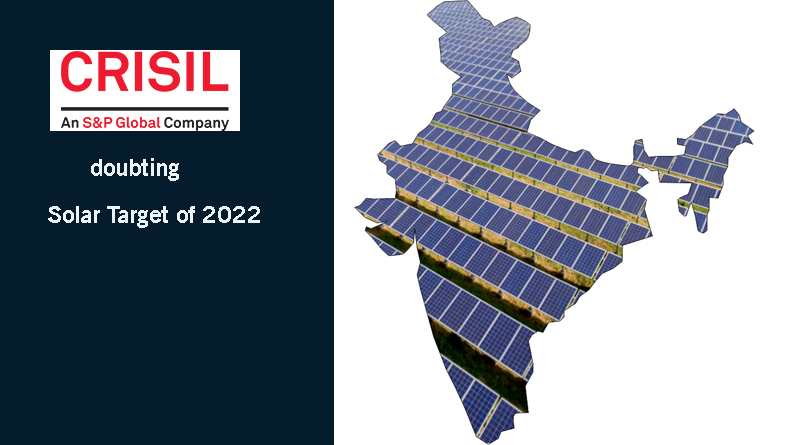

A new report released by CRISIL sounds a clear warning for the country’s solar ambitions, stating that the country is unlikely to achieve its solar targets by 2022. The report, quoted widely in the business press, states that achieving 100 GW, the stated target, may not happen at all, with the country placed to achieve a number closer to 78-80GW by 2022. This is in sharp contrast to the public announcements and utterances of the Union Minister for State for Power and renewable Energy, R.K. Singh. Not only has been Mr Singh expressing confidence about achieving the 100 GW number, but the MNRE ministry has moved on to regularly adding the word ‘comfortably’ to those numbers. In fact, while the CRISIL report still refes to the 175 GW overall target, readers will be aware that the MNRE has already ‘hiked’India’s target to 225 GW going by regular reports over the past three months, where this number has been quoted as the new renewables target. All flowing from the ‘certainty’ of achieving the earlier target of 175 GW.
So what could explain this divergence between the most respected ratings and research agency and the Ministry responsible for the targets? The safeguard duty is the immediate reason that comes to mind, and duly finds pride of place in the CRISIL report too. But the agency clearly wants the government to move ahead on the higher tariffs it will lead to, rather than trying to find a way around it. That’s a tough call, and clearly based on developer inputs, as the government as well as SECI, its primary nodal agency has repeatedly stressed that price drops are almost a golden rule for them. In fact, the cancellations of some of the recent auctions points to just how important pricing is. With global reports of a further drop in prices of Chinese imports, it is not unreasonable to expect at least soe of the safeguard duty impact to be managed by a further drop in Chinese prices, according to SECI officials we spoke to.
A second reason is the state of state government finances, which prevent them from supporting renewables as aggressively as the central government authority, the Solar energy Corporation of India. The SECI led auctions have been marked out for having a higher chance of success and completion on time, due to both clearer terms, financial clarity and supporting infrastructure.
The rooftop segment, for long flagged by us as the weakest link in the solar mission, comes in for special mention for the same old reasons, lack of enabling policy, and missing storage infrastructure at the right price. With developers taking on most of the risk for the ‘opex’ model where they simply collect consumption charges from the site owner, the rooftop segment is simply unable to find a solution that will make it take off.
So what explains the minister’s optimism? Bravado and wishes aside, it could be based on the hope of a really large auction sometime in 2019, in the region of 50GW to 100 GW, as the minister has repeatedly been indicating. It is quite possible that the government is waiting to see the ground situation improve sufficiently to make such a large auction possible, be it available financing, cost of imports, or ramp up of domestic capacity and ability to manufacture more. Besides this, there remain some very viable but ignored options to add capacity, be it a concerted push for solar water pumps, or even higher solar adoption through mini-grids and off grid areas.
But one thing is clear. While the CRISIL report seems too focused on developer led issues, the government is leaving too much to do post 2019, an election year. That leaves it open to the charge that a failure in 2022 will be blamed on the other government, in case power changes hands at the centre, while a win for the government in 2019 could lead to some very frenetic action indeed in the solar space.
In a key step toward advancing clean energy adoption, Ahmedabad headquartered IRM Energy Ltd has…
Biofuels conglomerate Aemetis has announced that its subsidiary in India – Universal Biofuels – has…
The Greater Noida Industrial Development Authority (GNIDA) has commenced construction of a 300-tonne-per-day (TPD) bio-CNG…
The World Earth Day – with this year’s theme on ‘Our Power, Our Planet’ –…
In a significant step toward promoting decentralized waste management and clean energy, Tata Steel UISL…
Jaipur headquartered bioenergy player Rajputana Biodiesel Ltd has announced that its subsidiary, Nirvaanraj Energy Private…